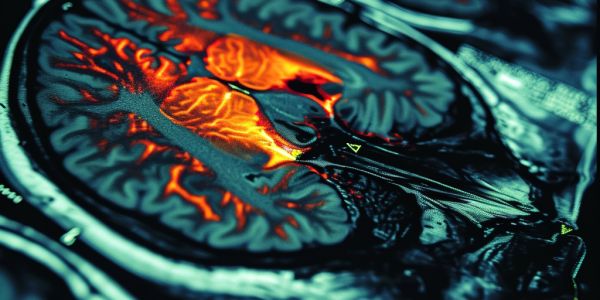Study Links African Ancestry Genes to Brain Disorders in Black Americans
A recent study reveals the potential link between African ancestry genes and increased risk of brain disorders among Black Americans. Genes associated with African ancestry impact specific brain cells, elevating the risk of conditions like Alzheimer’s and stroke. Conversely, genes linked to European ancestry may increase susceptibility to Parkinson’s. Societal factors like economic stress and racial bias in diagnosis also play a role in heightened risk. The study, published in Nature Neuroscience, highlights the importance of addressing disparities in neurological disorders and the need for more representation of Black Americans in genomic research.
Groundbreaking Dementia Prediction Method Discovered by International Research Team
Groundbreaking research led by Queen Mary University of London has developed a new method to predict dementia up to nine years before diagnosis with over 80% accuracy. By analyzing changes in the brain’s ‘default mode network’ using fMRI scans, this innovative approach could revolutionize dementia treatment by allowing for earlier interventions and personalized healthcare strategies.
Alzheimer’s Research Paper Retracted Due to Image Manipulation Allegations
A landmark Alzheimer’s disease research paper published in Nature in 2006 is being retracted due to allegations of image manipulation. University of Minnesota (UMN) Twin Cities neuroscientist Karen Ashe, the senior author of the study, has acknowledged that the paper contains doctored images. The retraction raises questions about the trustworthiness of researchers in the scientific community and underscores the need for rigorous oversight and scrutiny in scientific publications to maintain credibility.
New Genetic Variant Identified as Clear Cause of Alzheimer’s Disease
New research has identified the APOE4 gene variant as a clear cause of Alzheimer’s disease, with individuals having two copies at increased risk. Dr. Juan Fortea’s study suggests that having two copies of APOE4 may not only increase the chances of developing Alzheimer’s but could actually be a direct cause of the disease. This discovery opens up avenues for targeted research and interventions, potentially leading to early diagnosis and tailored treatments for affected individuals.
Promising Results in Improving Alzheimer’s Symptoms Through Lifestyle Changes
Recent research has shown promising results in improving Alzheimer’s symptoms through lifestyle changes. A study published in Alzheimer’s Research and Therapy revealed cognitive improvement in individuals with mild cognitive impairment or early dementia. Participants like Tammy Maida and Mike Carver regained cognitive abilities through the intervention, offering hope for those affected by Alzheimer’s disease.
Understanding Dementia: Challenges and Strategies for Care
Learn about the prevalence of dementia globally and the importance of early intervention and supportive strategies. Dr. Sameer Gupta emphasizes the significance of understanding dementia as a neurocognitive disorder and highlights key indicators for timely intervention. With over 55 million people living with dementia, raising awareness and promoting early detection are crucial for improving the lives of those affected.
Remarkable Improvement in Brain Health of Alzheimer’s Patient
Discover the astonishing improvement in brain health of a patient battling early signs of Alzheimer’s disease. Learn how lifestyle changes, not medication, played a key role in transforming the brain biomarkers of Simon Nicholls. Find out how his proactive approach to health management offers hope for those with genetic predispositions to Alzheimer’s.
Link Between Traumatic Life Events and Alzheimer’s Risk
Recent studies suggest a potential link between traumatic life events and the risk of developing Alzheimer’s disease. Individuals who experienced stress at a young age may be more susceptible to Alzheimer’s later in life, as observed through higher levels of Alzheimer’s-associated proteins in spinal fluid samples. Despite ongoing research efforts, the exact cause of Alzheimer’s remains unclear, with genetic factors and protein production in the brain being common markers. Analyzing spinal fluid for these proteins could serve as an effective diagnostic tool, as shown in recent studies from Columbia University and Spain. The study published in the Annals of Neurology highlights the significance of stressful life events in contributing to Alzheimer’s development.
Study Reveals APOE4 Homozygosity as Distinct Genetic Form of Alzheimer’s Disease
A new study reveals that APOE4 homozygosity represents a distinct genetic form of Alzheimer’s disease, with near-full penetrance of AD biology, earlier symptom onset, and specific biomarker changes. Individualized prevention strategies and treatments are emphasized for this unique genetic profile.
New Study Targets Microglia to Fight Alzheimer’s Disease
Researchers at Washington University School of Medicine are focusing on mobilizing microglia, the brain’s immune cells, in the fight against Alzheimer’s disease. Dr. Marco Colonna’s study explores targeting a receptor on microglia to combat harmful amyloid plaques. By developing an antibody to block the receptor, the team reduced plaque formation in animal models. This research opens new possibilities for Alzheimer’s drug development beyond current FDA-approved medications.










